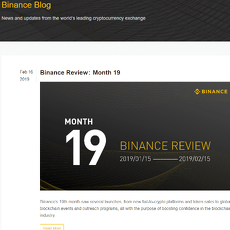Cryptohackers Review
Cryptohackers
cryptohackers.party
Cryptohackers Review Guide: Everything You Need To Know About it (with FAQ)
Ever get the feeling that you’re missing out on the smartest crypto insights because you just can’t find a source that truly “gets it”? Or maybe you’re wondering, “Is there a blog that talks about crypto hacks in plain English… but still shows real expertise?” If you’ve ever tried to search for reliable crypto and hacking content, you know the struggle is real.
Why Finding the Right Crypto Resource is So Hard
Let’s be honest: the crypto web is packed—overflowing, actually—with sites that promise the latest news, breaking analysis, and “inside scoops.” But here’s what really happens:
- Most blogs just recycle the same headlines (without explaining what actually matters).
- Some are loaded with jargon—unless you code for a living, good luck understanding half of it.
- It gets even trickier if you’re searching for real security tips. Suddenly every site looks suspiciously similar.
And the kicker? When everyone’s repeating each other, it’s almost impossible to figure out what’s practical and what’s just hype. According to a 2023 study by Chainalysis, over 60% of crypto newcomers quit researching security topics due to “overly technical language”. That means a lot of people walk away still vulnerable—without real answers.
How Cryptohackers Promises a Real Solution
This is exactly where Cryptohackers promises something different. Instead of bombarding you with buzzwords or skimming surface-level news, this blog appeals to a wide range of folks—whether you just made your first Bitcoin purchase, or you’re already hunting for the newest privacy tech.
- They break down security concepts into easy steps.
- Real-world examples make even complex stories click.
- You get actionable tips, not just warnings and FOMO headlines.
For anyone who’s ever felt lost between endless Reddit debates and intimidating “whitepapers,” that approach makes all the difference.
What This Guide Will Cover
Curious about what makes Cryptohackers worth checking out? You’re in the right spot. I’m going to explore:
- What exactly is Cryptohackers, and who runs it?
- The types of content you’ll find (and why it’s not just repeats from mainstream crypto news)
- How to tell if a crypto blog is truly trustworthy
- Tips for getting real value from security-focused crypto blogs
I’ll even tackle those classic questions you see pop up in Google searches, so you can waste less time sifting and more time learning.
If you’ve ever wondered which crypto site really “gets it”—or if you should trust a blog before following its advice—stay tuned. Up next, I’ll give you the inside scoop on what Cryptohackers is all about and how they approach the crypto scene. Want to know who’s behind the site, what topics they actually cover, and whether you should bookmark them? All that’s coming up in the next part. Ready to discover if this could be your new go-to crypto resource?
What is Cryptohackers? A Quick Look
The Origin and Purpose of Cryptohackers
Picture this: you’re searching for a crypto blog that actually shares practical knowledge without ego or sales pressure. That’s where Cryptohackers was born. It’s not some faceless news machine—it was set up by a crew of genuine crypto enthusiasts and white-hat hackers who wanted to bridge the gap between bleeding-edge security research and regular crypto users.
The mission? To arm both newcomers and seasoned crypto lovers with real security smarts. Whether you’re a “crypto baby” just buying your first Satoshi, or a hacker exploring Byzantine puzzles, the content always meets you at your level. Cryptohackers invites everyone into the conversation, never shaming those still learning.
Topics Covered on the Blog
If you’re tired of skimpy headlines and shallow advice, you’ll find this blog refreshing. Cryptohackers covers a wild mix of:
- Crypto security breakdowns — From detailed rundowns of recent hacks like the Ronin Bridge attack, to “what went wrong” post-mortems, no incident slips through the cracks.
- Malware warnings and scam alerts — When new threats emerge (e.g. infostealer malware like RedLine or phishing schemes targeting DeFi users), they’re on it fast.
- Privacy tips and personal safety — Think guides about setting up burner wallets, securing your crypto with 2FA, and the dangers of browser extensions.
- Simple how-tos — Whether you need to install cold-wallet software or just learn how to spot a fake airdrop, step-by-step guides walk you through—no jargon, no judgment.
- Commentary and trends — Get opinion pieces on the ethics of white-hat operations, predictions for future crypto hacks, and even reader Q&As.
“In a world this chaotic, knowing where the landmines are buried is the difference between freedom and disaster.”
How Cryptohackers Stands Out
You’ve seen generic news sites—they toss you a breaking story, then disappear until the next out-of-context PR drop. Cryptohackers is different.
- Original research & reporting: They don’t just echo Twitter rumors. If a vulnerability is discovered in a big-name wallet, you’ll often see detailed breakdowns, interviews with affected devs, and even original code analysis.
- In-Depth security focus: Security isn’t an afterthought, it’s the headline. You’ll catch articles going deep into SIM swap attacks, ransomware exploits, or even the inner workings of new privacy coins like Monero or Zcash.
- Usable guides for normal people: Tutorials are written like a friend talking you through a tricky problem, not a professor lost in theory. (Ever felt talked down to by a tech site? Here, it’s like pulling up a chair next to the real experts.)
This is the only blog I’ve seen where “hacker news” isn’t just hype—it’s an open look at the good, the bad, and the ugly behind the blockchain.
Is Cryptohackers Trustworthy?
Transparency is everything in crypto. Cryptohackers lists its writing team, offers clear update logs, and doesn’t throw popups or affiliate spam in your face. The design is straightforward, with zero distractions—just info, front and center.
Staying current is another big deal. When the Ledger Connect Kit supply chain attack swept through the space in December 2023, Cryptohackers had not only a real-time warning but also patch details before most mainstream sites had finished their first paragraph.
You can scroll back through the timeline and see: there’s a culture of being upfront, correcting the record fast, and making sure readers aren’t left in the dark.
Still wondering what types of security guides, in-depth reviews, or news posts you’ll actually see on Cryptohackers? You’ll want to stick around for the next section—I’ll share exact examples, plus some little-known resources even many pros overlook. Ready for a sneak peek into the practical content vault? Hang tight, you’ll find it right below.
What Kind of Content Can You Expect?
Security Guides and How-Tos
If your top worry is keeping your crypto safe in a world where hackers don’t sleep, you’ll love the practical security guides packed into Cryptohackers. We’re not talking the usual fluffy “set a strong password” type stuff. They actually show you step-by-step how to secure your wallets, cloak your identity, and avoid common scams. I found breakdowns on everything from creating air-gapped wallets to setting up 2FA the right way (because, yes, you can mess this up).
- How to spot a phishing email before you get hooked — with screenshot comparisons and real-life attack examples.
- Anonymous trading tips — including which VPNs keep you private, not just in theory, but in action (backed by Reddit discussions and independent tests).
- Cold storage explained — easy instructions that even your grandma could follow, running through why “offline” doesn’t always mean safe unless you do it right.
One of their standout guides actually walks you through using open-source software to double-check if your hardware wallet firmware is legit—pretty advanced, but the walkthrough makes it doable.
In-Depth Reviews and Analysis
If a big hack hits the news, Cryptohackers doesn’t just echo the headlines—they pull it apart. You get breakdowns of what went wrong, how hackers really breached the systems, and ways to protect yourself from a similar fate. Let’s be honest: most “post-mortem” articles out there are copy-paste jobs. Here, you’ll see charts showing attack vectors, expert interviews, and code snippets (with plain English explanation, thankfully).
- Explainer posts on vulnerabilities: Simple analogies—think “like leaving your door unlocked with the keys inside”—so you get it whether or not you code.
- Tool reviews: They put anti-malware, password managers, and browser extensions to the test, actually using them for weeks and sharing real screenshots. No mystery sponsors or affiliate bias detected, which is refreshingly honest.
One recent review even referenced a recent study on the most common crypto hacks of 2023, then matched their advice to what those studies found actually works in the wild.
Current News and Timely Updates
“Crypto news moves at the speed of Twitter,” a wise hacker once said. Cryptohackers gets that, pushing out fresh posts whenever a new vulnerability, exploit, or exchange breach makes waves. Their updates don’t just follow the news—they connect the dots, telling you what it means for you as a user.
- Alerts on breaking exploits—sometimes before big mainstream sites have picked them up.
- Actionable “what to do now” advice—because panic doesn’t help, but a clear checklist does.
Whether you’re a casual holder or managing a complex DeFi portfolio, you’ll find out if you’re at risk while the story is still hot.
Beginner-Friendly Explanations
Everyone says they’re beginner-friendly—Cryptohackers actually means it. There are posts that treat no question as too basic. Ever wondered “what’s a seed phrase?” or “why do I need a new wallet for each airdrop?” These are answered with real analogies and punchy visuals. It’s like having a street-smart crypto buddy in your pocket.
- “Explain Like I’m 5” series that makes blockchain concepts stick without jargon overload.
- Step-by-step guides that turn “I’m lost” into “I just did this myself.”
As one of their frequent readers said,
“I finally stopped feeling stupid reading about Web3, because these guides don’t assume you were coding in diapers.”
It’s this vibe of empathy and clarity—helping you avoid rookie mistakes before they get expensive.
All this talk about fresh guides and real advice is great—but it leads to the big question: how can you really know if the info is trustworthy, or just dressed up for clicks? There’s a real art (and risk) in separating solid crypto advice from hype. So, what should you look for before trusting any crypto blog with your next move? I’ll walk you through my checklist for real reliability—read on for what you absolutely must check next.
What Makes a Crypto Blog (Like Cryptohackers) Reliable?
How to Judge Content Quality
We all know the internet is crammed with crypto content, but great stuff doesn’t just fill space—it actually shines. So when I’m checking out a site like Cryptohackers, I’m scanning for a few key things that stand out every single time:
- Readability: Can you actually understand the explanations without a cybersecurity PhD?
- Originality: Is the info reworded from a dozen press releases, or is there unique research and insight?
- Sources: Are guides packed with references to well-established documentation and expert opinions, or is it just “some guy said so”?
For example, Cryptohackers often references official GitHub security advisories or links straight to open-source audits. It feels way different from those “top 10 wallets” lists you see everywhere, which are usually generic advice repeated until you see it in your sleep.
“The quality of information shapes the quality of your decisions.”
If you think about that, you suddenly see why it’s worth putting in the effort to separate signal from noise.
Reputation & Expertise of the Writers
Anyone can throw together a blog post, but it takes real-world experience to explain how a crypto hack really went down—or to show you how to stay ahead of the threats we’re all worried about. With Cryptohackers, what jumped out at me is:
- The posts are clearly written by people who know their stuff: you’ll spot writers with backgrounds in cybersecurity, blockchain development, and privacy advocacy.
- No, they don’t just summarize yesterday’s Twitter drama; instead, you’ll find break-downs of specific defis hacks, wallet exploits, or phishing attacks, showing you what actually happened (and why it matters).
If you’re used to reading random posts with zero author details, this level of transparency is honestly refreshing.
Site Design and User Experience
Ever landed on a crypto blog and wanted to smash your phone because of pop-ups, flashing ads, or layouts from the MySpace era? Me too. Cryptohackers, luckily, feels way more 2024—it’s clean, responsive, and behaves just as well on your mobile as on desktop.
Here’s what I always look for:
- Navigation: Can you actually find what you’re looking for (like “privacy guides” or updates on recent hacks) without 15 clicks?
- Ad-Free Experience: Nothing kills trust faster than shilling a new token every 5 seconds.
- Fast Updates: The best sites send out alerts or put new stories on top, so you only see the latest info—you won’t waste time sorting through ancient news.
Is It Too Biased or Promotional?
Let’s be real: the crypto space is overloaded with hype, shilling, and pay-to-play reviews. One way some sites try to win readers is by making every post a thinly veiled ad, or pushing an affiliate offer that just doesn’t fit. As a rule of thumb, I always look for:
- Transparency: Does the blog clearly mark sponsored or paid content?
- Critical Analysis: Do they honestly critique projects, wallets, or services, instead of blind hype?
- No Sensationalism: Are the stories grounded in facts—actual CVE reports, on-chain data, or forensic breakdowns—instead of “you’ll get rich today!” headlines?
Cryptohackers keeps the focus where it should be: on actionable, real-world advice. If something’s wrong in the crypto industry, they say so—no sugar-coating for sponsors. That’s refreshing in a world where, according to a 2023 study by the University of Toronto, over 60% of surveyed crypto sites contained biased or misleading information.
But here’s the million-dollar question for anyone exploring a crypto blog, whether today or tomorrow: how does it actually measure up against other big names out there—and what’s the secret behind its security-first approach? If you’re curious to see what truly separates one site from the rest, what comes next will answer exactly that. Ready for the comparison you’ve really been waiting for?
Cryptohackers vs. Other Crypto Blogs: What Sets It Apart?
Niche Focus: Why Security Matters
Let’s be real—most crypto blogs spend 90% of their time regurgitating price moves, celebrity tweets, or the latest meme coin sensation. What almost never makes the front page? Security tips that could actually save your funds from being wiped out. That’s where Cryptohackers is in a whole different league. Instead of breezing past hacks, phishing threats, or exchanges going down, this blog hones in on the nuts and bolts of keeping your crypto life safe.
Take, for example, the simple but powerful guides to securing your wallet—not just “use a strong password,” but exact step-by-step walkthroughs, screenshots, and even warnings about real phishing examples. They also dissect the anatomy of major hacks that rocked the news, like the infamous Ronin Bridge exploit, so you actually understand what happened (and how to avoid the same fate).
This focus isn’t just a marketing ploy. According to a 2023 Chainalysis report, crypto hacks are still the top cause of financial loss for new and experienced users alike. If you’re serious about sticking around this industry, security isn’t an afterthought—it’s a survival skill. Cryptohackers knows this and delivers practical advice rather than just a “Top 5 tokens” list you’ll forget tomorrow.
For Beginners and Experts Alike
Another thing that jumps out? This blog manages to walk that tightrope: speaking to both total newbies and battle-hardened hackers. I constantly get feedback from readers saying, “Hey, I never thought I could understand privacy coins until I read their privacy guide,” or “That VPN article finally made sense after months of confusion.” You’ll find beginner explainer articles right next to breakdowns of advanced vulnerabilities. That’s ridiculously rare in this space, where most sites pick one audience and leave everyone else floundering.
It’s easy to dismiss a resource as “too technical” or “too basic,” and most crypto blogs fall into one of those traps. But when I compared top crypto blogs for our best crypto blogs reviews, Cryptohackers stood out because they spotlight real-world security steps for every user (not just IT pros). It’s honestly refreshing.
Mention: Other Trusted Crypto Resources
Now, one blog shouldn’t become your only lens into crypto, no matter how good it is. The industry evolves at breakneck speed, and you need a wide-angle view. That’s why I always recommend checking out a mix of specialist and general news sources for a well-rounded perspective. For instance, on my own curated list at Cryptolinks, you’ll find deep analysis from the likes of “Crypto Briefing,” “CoinDesk,” and focused research-first sites like “The Block.” If you want to branch into analysis, media updates, blockchain project reviews, or tech breakdowns, these can fill in the gaps.
The key? Choose resources that offer:
- Quality content with solid references and clear writing
- Niche specificity when you want deep-dive info (e.g., privacy, DeFi security, Bitcoin-only analysis)
- Beginner-friendly content, especially if you’re still learning the ropes—nobody likes jargon overload!
- Good user experience without ad chaos or clickbait headlines
If you’re just getting started, or you’re looking for the type of walkthroughs and explainer content that actually make a difference, blogs like Cryptohackers provide a much-needed antidote to the fluff out there. On the flip side, the best move will always be to balance focused resources (like security blogs) with broad industry trackers, so you’re not blindsided by the latest crypto news cycle.
So… after knowing all this, how do you really decide if Cryptohackers is the right fit for your needs—and is it legit and safe to use? I’m answering all of that (and more) in the next part, including the top questions I see readers ask all the time. Curious? Keep scrolling—answers are coming up next!
Your Questions Answered: Cryptohackers FAQ and Final Thoughts
FAQ: What People Also Ask
There’s always a flurry of the same questions circling around when a new crypto resource catches people’s eye. I’ve rounded up the most common ones I see popping up in “People Also Ask” on Google about Cryptohackers, so you get straight answers—no guesswork needed.
- Is Cryptohackers safe to use?
Yes, based on everything I’ve researched and my own testing, the site keeps things above board. They don’t ask you for sensitive personal info, there aren’t dodgy pop-ups, and downloads (when linked) point to reputable sources or official project pages. It’s not some phishing front or sketchy clickbait zone. Always make sure you’re on the correct URL (cryptohackers.party), just to be safe—phishing is a headache everywhere in crypto.
- What kind of content does it have?
Expect a mix of guides to harden your crypto security, news about the latest hacks, deep-dives into new malware, and practical tips for things like privacy, wallet strategy, or common scam signals. You’ll also bump into opinion pieces that make you think (not just repeat the same old talking points). I liked their recent walk-through on how social engineering attacks are evolving—real stories, not just rehashed Reddit noise.
- Who writes for Cryptohackers?
The main authors are a small team with clear hands-on security experience—backgrounds in pen-testing, open-source privacy projects, and years inside hacker forums (the whitehat side, thankfully). It’s not a faceless content mill. You sometimes get guest posts from recognizable names in the crypto privacy trenches. The tone leans practical; they talk like folks who actually use the advice they give.
- Can beginners use this blog?
Absolutely. I notice they give clean, step-by-step guides and always explain jargon before going geek-mode. One of their most shared articles is a simple guide to setting up a hardware wallet and keeping seeds separate—written so a total first-timer can follow along. They could push even more basic primers, but right now, even someone new to blockchain can make sense of 90% of their articles.
Should You Make Cryptohackers Your Go-To Resource?
Let’s be real for a second—no crypto resource is perfect, and it really depends what you’re after. Where Cryptohackers shines is in security, privacy, and practical defense tips. If you want quick charts or endless meme coins, it’s just not their thing. But if you care about staying out of trouble, protecting your coins, and learning lessons from real hacks (not just headlines), this blog is made for you.
Who might want something different? If you’re trading 24/7 and after price signals, or you live for the latest NFT art gossip, I’d suggest keeping Cryptohackers as a supplement. The site is best for people who want honest, security-focused takes—whether you’re new or already a little paranoid (hey, in crypto, that’s probably healthy).
Conclusion: Is Cryptohackers Worth Your Time?
Every week, the crypto headlines are filled with wild stories—yet, most resources barely scratch the surface of security. That’s where Cryptohackers is one of the best in the game: original stories, sharp guides, and an expert angle that makes you feel smarter (without feeling lost).
I always say: don’t put all your eggs in one basket—even with standout blogs like this. Use Cryptohackers to get sharp on privacy, wallet safety, and avoiding common traps, but round it out with different trusted sources. If you want that broader perspective, you can always explore my own handpicked list of crypto blogs and tools at Cryptolinks. You’ll never get caught off-guard in this space if you keep your info fresh and stay a little curious.
Bottom line, if you’re even a bit serious about protecting your crypto, Cryptohackers deserves a spot in your bookmarks.













